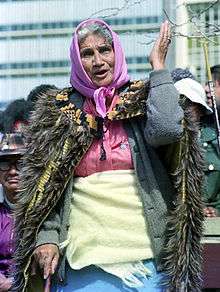Whina Cooper
| Dame Whina Cooper ONZ DBE | |
|---|---|
 Whina Cooper addressing the Māori Land March at Hamilton in 1975 | |
| Born |
Hōhepine Te Wake 9 December 1895 Te Karaka, Hokianga, New Zealand |
| Died |
26 March 1994 (aged 98) Panguru, New Zealand |
| Occupation | Schoolteacher, historian, activist |
Dame Whina Cooper ONZ DBE (9 December 1895 – 26 March 1994) was a respected kuia (Māori elder), who worked for many years for the rights of her people, and particularly to improve the lot of Māori women. Her wide influence and nationally recognised activity led her to be acknowledged with awards in both the British (Imperial) and New Zealand Royal Honours Systems, and by her own people, who bestowed the title Te Whaea o te Motu ("Mother of the Nation") upon her.
Early life
Dame Whina Cooper was born Hōhepine Te Wake,[1] daughter of Catholic catechist Heremia Te Wake and Kare Pauro Kawatihi, of the Te Rarawa iwi, at Te Karaka, Hokianga.[2]
From an early age she showed an interest in her father’s role, as well as in history and genealogy. She worked as a teacher for a brief time, but stirred on by a local land dispute, developed a taste for a form of home-spun politics, including passive resistance. She played a leading role in community activities, impressing politician Sir Āpirana Ngata who invited her to a national hui in 1932. She worked alongside him to promote Māori land development programmes in Hokianga.
National political activity
She moved to Auckland in 1949 when her second husband, William Cooper, died. Her political activity changed from local to national. In September 1951 she was elected first president of the new Māori Women's Welfare League[3] "which was able to improve things notably for Maori women", working on health, housing, education, and welfare.[4] In 1957 she stepped down as president and the annual conference rewarded her with the title Te Whaea o te Motu ("Mother of the Nation"). During the 1960s she worked on a local level around Auckland, but kept largely out of the national spotlight. This changed in 1975 when a coalition of Māori groups asked her to lead them in a protest against the loss of Māori land. She agreed, proposing a hikoi (a symbolic march) from the northern tip of the North Island to Parliament in Wellington at the other end of the island. [5]
During September and October 1975, the nearly 80-year-old Cooper again became nationally recognised, walking at the head of the Māori land march from Te Hapua to Wellington.
In the 1953 Coronation Honours Cooper was appointed a Member of the Order of the British Empire for services to the Māori people.[6] In the 1974 Queen's Birthday Honours she was promoted to Commander of The Order of the British Empire for services to Māori welfare and culture.[7] In the 1981 New Year Honours Cooper was further promoted to Dame Commander of the Order of the British Empire[8] and on 6 February 1991, she became the twentieth appointee to The Order of New Zealand,[9][10] New Zealand's highest civil honour. In 1993, Cooper was awarded the New Zealand Suffrage Centennial Medal.[11]
Death
Cooper returned to Panguru in the Hokianga in 1983 and died there, aged 98, in 1994.
References
- ↑ King, Michael (1983). Whina, a biography of Whina Cooper. Hodder and Staughton. p. 36. ISBN 0-340-338733.
- ↑ Oliver, Steven. "Heremia Te Wake". Dictionary of New Zealand Biography. Ministry for Culture and Heritage. Retrieved 23 April 2017.
- ↑ Ministry for Culture and Heritage (6 May 2010). "Dame Whina Cooper". Retrieved 17 April 2011.
- ↑ Grau, Marion (2011). Rethinking Mission in the Postcolony: Salvation, Society and Subversion. A&C Black. pp. 58–59. ISBN 9780567280886.
- ↑ King, Michael (2000). "'Cooper, Whina', Dictionary of New Zealand Biography".
- ↑ "No. 39866". The London Gazette (4th supplement). 1 June 1953. p. 3005.
- ↑ "No. 46312". The London Gazette (3rd supplement). 7 June 1974. p. 6830.
- ↑ "No. 48469". The London Gazette (3rd supplement). 30 December 1980. pp. 39–44.
- ↑ "The Queen's Birthday Honours List." (1 July 1991) 98 New Zealand Gazette 2191.
- ↑ "No. 52564". The London Gazette (2nd supplement). 14 June 1991. p. 29.
- ↑ "The New Zealand Suffrage Centennial Medal 1993 – register of recipients". Department of the Prime Minister and Cabinet. 26 July 2018. Retrieved 18 September 2018.
Further reading
- King, Michael (2003). Cooper, Whina 1895 - 1994 (biography of Dame Whina Cooper)
External links
| Wikimedia Commons has media related to Whina Cooper. |
- Whina Cooper biography from the Dictionary of New Zealand Biography
- Te Matakite O Aotearoa - The Maori Land March - Full-length documentary about the 1975 march, featuring interviews with Whina Cooper on NZ On Screen
- "Whina: Te Whaea o Te Motu", 1992 documentary on the life of Dame Whina Cooper